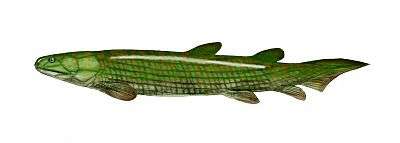Osteolepidida
Osteolepidida, also known as osteolepiformes,[1] are a group of prehistoric lobe-finned fishes which appeared first time during the Devonian period. The order contains five families: Canowindridae, Megalichthyidae, Osteolepidae, Thysanolepidae and Tristichopteridae. The superorder is generally considered to be paraphyletic because the characters that define it are mainly attributes of stem tetrapodomorphs.[1]
| Osteolepidida | |
|---|---|
 | |
| Osteolepis. | |
| Scientific classification | |
| Kingdom: | |
| Phylum: | |
| Subphylum: | |
| Class: | |
| Subclass: | |
| Superorder: | Osteolepidida* |
| Clades | |
Below is a cladogram showing the paraphyly of Osteolepiformes compiled and modified from Ahlberg and Johanson (1998).[1] See also Swartz 2012.[2] The Osteolepiformes are marked by the green bracket.
|
Osteolepidida |
References
- Ahlberg, P. E.; Johanson, Z. (1998). "Osteolepiforms and the ancestry of tetrapods" (PDF). Nature. 395 (6704): 792–794. Bibcode:1998Natur.395..792A. doi:10.1038/27421. Archived from the original (PDF) on 2014-11-24. Retrieved 2013-11-25.
- Swartz, B. (2012). "A marine stem-tetrapod from the Devonian of Western North America". PLoS ONE. 7 (3): e33683. Bibcode:2012PLoSO...733683S. doi:10.1371/journal.pone.0033683. PMC 3308997. PMID 22448265.
This article is issued from Wikipedia. The text is licensed under Creative Commons - Attribution - Sharealike. Additional terms may apply for the media files.